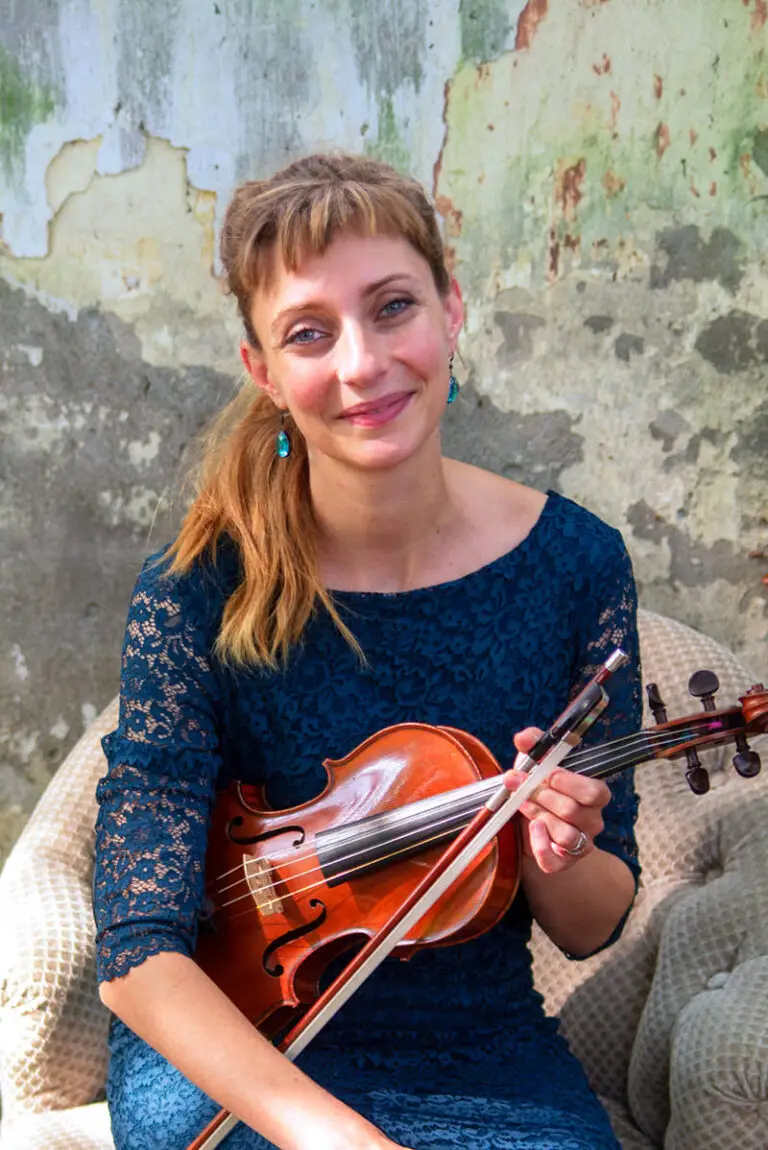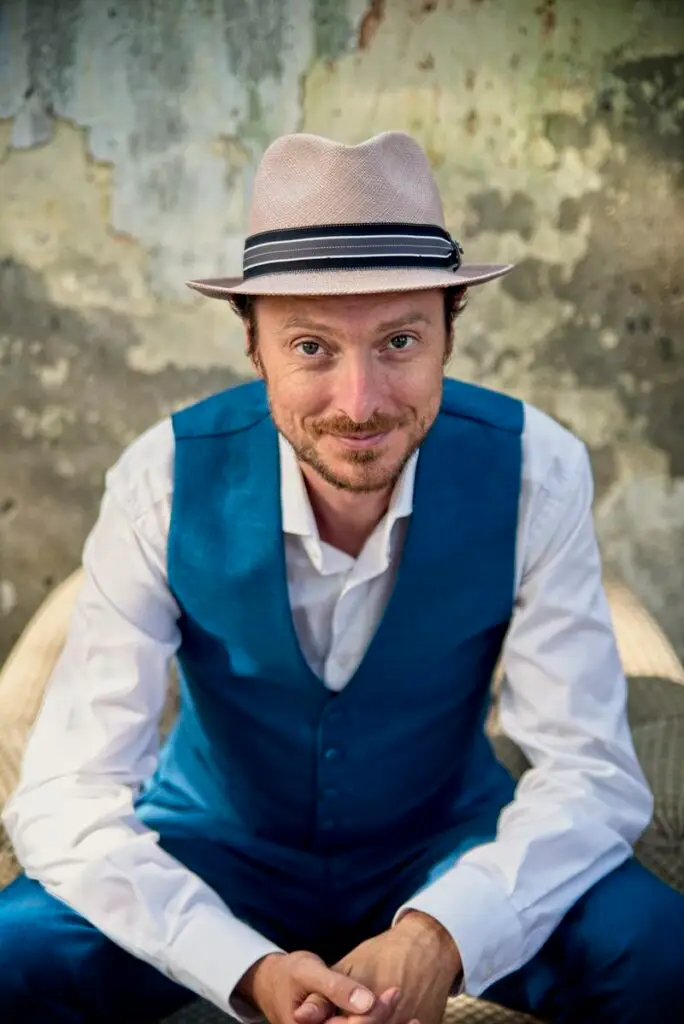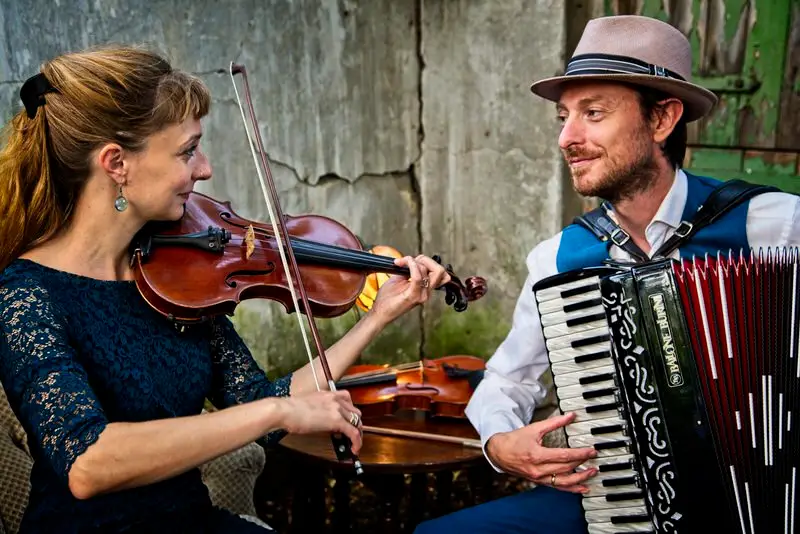A musical journey through Eastern Europe
In search of individuality, exchange and connection.
“Atsind” is the Yiddish word for “now” and serves as the guiding principle for this dynamic multi-instrumental duo featuring Nicolaas Cottenie and Alina Bauer.
Using a wide variety of string, plucked and keyboard instruments, the two musicians interpret pieces from traditional Eastern European musical cultures and skilfully bring them into our ‘now’.
Their repertoire includes traditional dance music from Romania, Bulgaria, Ukraine, Greece and Turkey, tracing the history of long-ago peoples’ movements.
The two musicians are fascinated by the fact that traditional musical styles allow us to look far back into the past and take the audience on a musical journey about the peculiarities and similarities of the different ethnic groups, which lived close together for centuries and whose togetherness and cultural exchange can also be traced in music to this day.
In their various programmes, Alina Bauer and Nicolaas Cottenie perform various violins, accordion, mandola and bass pedal and thus create a versatile musical framework for a wide variety of occasions – the classical concert evening, instructive school concerts or a musical supporting programme for private or company celebrations.
Alina Bauer
My love for Eastern European music began in 2007 when I first came into contact with klezmer music with the founding of my first band Bakad Kapelye. Countless workshop visits and some band experience later, I am now in the fortunate situation of giving and organizing workshops on klezmer and Eastern European music myself (2022 Leipzig Days for Klezmer and Eastern European Culture).
My most important band projects at the moment are the bands Halva and Azind, where we explore the conections between musical styles of the south east. I have also been working as a soloist and lecturer with the Erfurt Klezmer Orchestra since 2019.
As a child, I had a classical education on the violin. My first degree was musicology, music pedagogy and sociology, which I completed with a master’s degree. Afterwards I studied jazz violin at the Royal Conservatory of Brussels and did the Flemish teacher training.
In addition to my work as a performing musician, I am an enthusiastic violin teacher and try to bring people of all ages and backgrounds closer to themselves and into contact with other people through music-making.
You can find more information about my work at alinabauer.eu.

Nicolaas Cottenie
I learned to play the violin by ear as a child and only learned to read music way later. I got very deep into experimental electronic music as a teenager, opening my ears to the quality of timbre and sound. Later I studied jazz and went very deep into free improvisation, learning a method called Present Time Composition.
I worked as an academic researcher in the University of Leuven (Belgium) researching Embodied Music Cognition and its relevance to musical improvisation. After that, I worked as an artistic researcher in the Royal Conservatory of Antwerp (Belgium) looking into how to apply the things I learned in Leuven to the task of teaching classical music students to improvise. At the same time, I took a deep dive into classical harmony and voice leading.
Right now I’m focusing my research on Romanian and Greek traditional music, and where they are linked to klezmer music. In practice, that means sitting down to transcribe and analyse as many tunes as possible and to learn to play them in as many keys as possible on several instruments. I use what I learn there to write the music for my projects.
You can find more information about my work at nicolaascottenie.eu.

What we offer
Whether it’s concerts, school performances, or adding a lively touch to official and private parties, we are ready for any enjoyable occasion.

Azind’s concerts are a small firework of timbres, different musical worlds and emotions.
Small because there are only two of them. Fireworks, because the variety in sounds through the use oft he different instruments and the smooth changes between the different genres is simply a feast for the ears of a special kind.
Short announcements, which inform about the background of the individual pieces, guide the audience through the program and enable an extraordinary concert enjoyment.
Azind
- Nicolaas Cottenie – violin, eight-string violin, accordion and bass pedal
- Alina Bauer – violin, brasca, mandola and bass pedal
We regularly offer workshops on klezmer music.
Two formats have been established so far
- For all instruments
- Especially for violinists/strings
The focus is on the following topics:
- Learning tunes by ear and playing together
- Focusing on ornaments and rhythmical/melodic variation
- Accompanying using chord symbols, accompaniment patterns, specific playing techniques, groove, modes, scales
- Analyzing and copying selected historical recordings
- differentiating between genres such as Freylakhs, Sher, Bulgar, Khosidl, Hora, Kolomeyke…
Target groups
People with at least two years of experience playing their instrument, such as groups of pupils at mainstream schools, music schools or adult amateur musicians.
Narrative Concert: Klezmer Music – A Musical Example of Individuality, Exchange and Diversity
Suitable for grades 7-12
Klezmer music is the music of the Yiddish-speaking Jews, whose settlement area stretched from the Baltic to the Mediterranean until the 1940s. They lived in communities whose lives were marked by festivals and customs in which music was indispensable. And they lived together with other Christian communities that surrounded them, with whom they were always in active exchange.
Azind’s narrative concert program aims to focus on the aspects of this mutual influence: on the one hand, the individual and especially functional aspects of klezmer music within Yiddish life, and on the other hand, how the musicians integrated influences from their surroundings, be it certain pieces, playing styles, rhythms or instruments.
With the help of pictures, short explanations and lots of music, Nicolaas Cottenie and Alina Bauer perform klezmer music as well as traditional music from Romania, Ukraine, Bulgaria and Greece.
Teachers will be provided with materials to prepare for the concert and the level of content will be adapted to the different age groups.
Alina Bauer: violin, brasca, mandola, bass pedal, narrator
Nicolaas Cottenie: violin, 8-string violin, accordion, bass pedal, narrator
